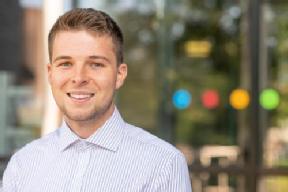Lucas Bartol-Bibb
 What attracted you to the Scheme?
What attracted you to the Scheme?
Having applied for the energy innovation pathway, I must admit that those two words “energy innovation” were the biggest attractions to me. The idea that I could genuinely be at the forefront - dealing with new technologies that are not yet at market and have an impact on the future, even making a minute difference, in the fight against our environmental emergency – was compelling.
As the role is within an industry facing part of the university, you get the benefits of a great public sector pension and the opportunity to conduct research and try never-before attempted things with new technologies, but you still get the understanding and appreciation of what it is to get these items to market and how to integrate new technologies into wider society.
What projects have you worked on?
I have worked across a wide range of projects, which is testament to how flexible and accommodating the graduate scheme and scheme manager are. Even through the pandemic, there have always been more opportunities arising than grads to take them. If you find a particular interest or success in an area, everything will be done to aid your progress and to help you either get a permanent job or to provide more graduate placement opportunities for you in that area.
I have so far investigated novel battery sensing technologies, electric motor cooling optimisation to increase power density achievable in motors, power electronics and intelligent switching and conducted a feasibility study into and planned the implementation of a solar farm installation on site at the University of Warwick.
In September, I began working on the RESO project: reporting on the progress to date and planned development of the University campus towards its 2030 net-zero carbon emissions target, but as part of this have worked with the team bidding for £28M from the government to implement renewable generation and low carbon heating technologies on campus, which has been intense but a great experience!
A typical day as a Graduate Engineer
Day-to-day work has varied for me across the projects. In the first two projects, I spent the early weeks researching and writing up literature reviews before designing and constructing my own experiments in later weeks. In the third project, I was modelling circuits on the computer, researching, calculating expectations based on theory and then testing these calculations and models. There would have been real, physical testing of the equipment had it not been for covid-19.
The final two projects - focusing on renewable generation and generally decarbonising the energy network of the University - involved learning the university’s development strategy and researching technologies and providers, before engaging with providers over emails, phone calls and teams meetings. It is rare there is a day without a meeting to discuss findings and progress, which really keeps you motivated to continue to learn and contribute high quality documents. I have been fortunate to discuss and debate options for sustainable development on campus with very senior staff. Everybody I have come across so far is genuinely interested in hearing your opinion and taking on board your comments, regardless of one’s role as a grad. I personally have found this very motivating and freeing.
However, this intensity of meeting and contact is not always the case, you have some control over how independent your work is usually; the project lead (your supervisor) will usually give you as much advice and guidance as you need but there is definitely a benefit to taking responsibility and conducting some independent work.
What are the best parts of the scheme?
Beyond the actual work, there is always a group of similarly motivated and aged people working with you. It is easy to form good relationships with the team you work with as well as with the fellow graduates. I currently live with 4 other graduates, 3 of whom I had never met before the scheme. We go on nights out together and play sports together like football (5 a side), badminton, tennis and hockey, or at least we did before covid-19!
Why should someone apply?
I would strongly recommend applying for this scheme because it gives you great qualifications (Project management and sustainable automotive engineering post-grad certificate or masters) while providing you the opportunity to work across such a wide range of engineering topics, where your placements really are decided with your career in mind.
